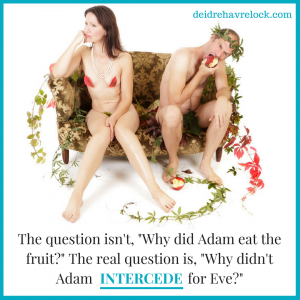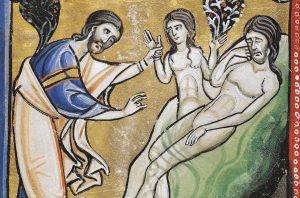In my last post I deconstructed the sin of Eve and in so doing, I came to the startling conclusion that Eve’s motivation for eating the fruit was based on her desire to gain what she already had — a God-like identity. In this post (which will prove to be even more shocking), I will be deconstructing Adam’s sin as found in Gen. 3:6 in order to unravel his motivation for eating the fruit.
Technically, Adam and Eve committed the same sin: they both disobeyed the law of God. However, each had a different motive for transgressing the law. And as we will soon discover motivation makes all the difference.
Motivation is often defined as “a need that requires satisfaction.” Discovering someone’s hidden need or desire is tricky work and as people who cannot get a good look inside the heart or mind of others, we often get it wrong (really wrong). However, God is extremely good at pinpointing a person’s inner motivations:
I am the one who searches minds and hearts, and I will give to each of you as your works deserve. — Rev. 2:23
The heart is devious above all else; it is perverse—who can understand it? I the LORD test the mind and search the heart, to give to all according to their ways, according to the fruit of their doings. –Jer. 17:9–10
I have found that we can uncover the motivation of Adam and Eve through examining the scriptures because, thankfully, the Holy Spirit has left us clues. So let’s deconstruct Adam’s fall and see what we’re told about why he ate that fruit. Before we continue though, I must warn you, once we begin looking into Adam’s heart — we may not like what we find there:
[Eve] took of its fruit and ate; and she also gave some to her husband, who was with her, and he ate. Then the eyes of both were opened, and they knew that they were naked; and they sewed fig leaves together and made loincloths for themselves. –Gen. 3:6-7
Obviously, there’s not a lot of information given in these two verses. All we’re told is “Adam ate.” But don’t worry, as there is something we can glean even from this short phrase.
Traditionally, we are given one basic (and strange) scenario with two equally questionable motivations for why Adam ate the fruit. The scenario goes something like this: Adam ate the fruit because Eve persuaded him to do so — his motivation then was to please Eve. In our imaginations we see Eve in the garden; she has just eaten the fruit and now she turns to her husband with a seductive smile and says something like, “Go ahead, you should eat this fruit. Do it for me.” –Oh wait, I happen to have a book sitting here on my desk that tells me what it was Eve actually said, “Whoa! Adam, come on honey, take a bite! Oh my goodness, come on, just one bite — if you don’t like it, you can spit it out!” (I’m not going to tell you the author… after all, I’m sure you also have a book on your desk which will tell you exactly what Eve said.) My point is, we have all come to accept that Eve “said something” to persuade Adam to eat. And sadly, Adam “listened” to Eve and he ate because he “loved” her.
So here we have Adam’s (suggested) motivation. His desire was to “please” Eve because of his (even deeper motivation) of “love” for her. (And this, by the way, is why women in general should not be allowed to lead men, just in case they lead them astray.)
In this traditional scenario, it was as though Adam’s thinking went… “Well, if Eve’s going down this road of death then we’re both going down it together because I love her so much.” But take note: the verse actually says, “[Eve] took of its fruit and ate; and she also gave some to her husband, who was with her, and he ate.” Throughout the whole scenario with the serpent and the fruit, Eve says nothing to Adam — Eve does NOT speak to Adam — Adam eats, and no persuasion is needed. ALL of Eve’s words are directed toward the serpent.
[tweetshare tweet=”We constantly INVENT scenarios where Eve PERSUADES Adam to eat the forbidden fruit. But the truth is Eve says NOTHING to Adam. Adam eats and his motivation is hidden–until now.” username=”deidrehavrelock”]
There are numerous problems with our traditional scenario. The first one being, of course, that Eve does not speak to Adam. The second problem is that “love never fails” (1 Cor. 13:8). Yet, strangely, Adam’s so called “love” did fail. So I have to conclude that eating the fruit was not done out of love.
Adam Did Not Eat the Forbidden Fruit because he Loved Eve
After all, when genuine love is involved, the first thing we do when a loved one falls into a trap set by an enemy is we rescue them; we plead for forgiveness and mercy on behalf of the one we love – we want to help them to become restored. What we don’t usually do is join them in their sin (unless we’re a little mixed up ourselves).
And if we are deeply in love with someone (as Jesus is with humanity), we might even substitute ourselves with the person who committed the sin, saying “Let me take the consequence instead!” (As Jesus did for us). Interceding for humankind, that certainly is what Jesus did. He is our faithful intercessor:
Are we not sure that it is Christ Jesus, who died—yes and more, who was raised from the dead and is at God’s right hand—and who is adding his plea for us? –Rom. 8:34, NJB
Jesus does not follow people into sin because he “loves” them. Love rescues people. Love truly helps people. So when Adam didn’t step up for Eve — by interceding for her restoration — Jesus did. Jesus is the one who did not fail Eve. Jesus is the one working for Eve’s complete restoration.
[tweetshare tweet=”Love truly helps people. So when Adam didn’t step up for Eve – by interceding for her restoration – Jesus did. Jesus is the one who did not fail Eve. Jesus is the one working for Eve’s complete restoration.” username=”deidrehavrelock”]
Why Did Adam Eat that Fruit?
So now we are back to our quest for Adam’s true motivation. The first place to start is to notice that Eve was “deceived” by the serpent but Adam was not:
For Adam was formed first, then Eve; and Adam was not deceived, but the woman was deceived and became a transgressor. –1 Tim. 2:13–14, bold added
The next thing to notice is that death came — not through Eve’s sin — but through Adam’s sin:
“Therefore, just as sin came into the world through one man, and death came through sin, and so death spread to all because all have sinned—sin was indeed in the world before the law, but sin is not reckoned when there is no law. Yet death exercised dominion from Adam to Moses, even over those whose sins were not like the transgression of Adam, who is a type of the one who was to come.” —Rom. 5:12-14, bold added
Another thing we should notice is that the above verses actually speak about two differing types of sin: “death exercised dominion from Adam to Moses, even over those whose sins were not like the transgression of Adam.” So the question we are forced to ask is, whose sin was not like the transgression of Adam? Well, obviously, it was Eve’s sin since she was the only other person who existed with Adam and had also sinned.
There are Two Types of Sin Described in the Bible
So let’s go back to both Eve and Adam’s original sin to determine why these two sins are fundamentally different, even though, technically, they are the same sin:
But the serpent said to the woman, “You will not die; for God knows that when you eat of it your eyes will be opened, and you will be like God, knowing good and evil.” So when the woman saw that the tree was good for food, and that it was a delight to the eyes, and that the tree was to be desired to make one wise, she took of its fruit and ate; and she also gave some to her husband, who was with her, and he ate. –Gen. 3:4–6
By examining Eve’s sin (which I did in my last post) we find that Eve was most definitely deceived — her mind was targeted — she became strangely convinced (deceived) that grasping the fruit could possibly make her like her God and so she ate despite the fact that she was already like God, created in God’s very image and likeness. Now this sin does not bring about death. So we can conclude that being “deceived” is not a mortal sin:
If you see your brother or sister committing what is not a mortal sin, you will ask and God will give life to such a one—to those whose sin is not mortal. There is sin that is mortal; I do not say that you should pray about that. All wrongdoing is sin, but there is sin that is not mortal. —1 Jn. 5:16–17
Or perhaps for clarity, we should read it in the NIV:
Suppose you see your brother or sister commit a sin. But that sin is not the kind that leads to death. Then you should pray for them. And God will give life to them. I’m talking about someone whose sin does not lead to death. But there is a sin that does lead to death. I’m not saying that you should pray about that. Every wrong thing we do is sin. But there are sins that do not lead to death. — 1 Jn. 5:16–17, bold added

The first type of sin that the Bible speaks about is called unintentional sin. This sin is not directed against God — it needs only to be brought to light and an intercessor can forgive the sin:
When a ruler sins, doing unintentionally any one of all the things that by commandments of the Lord his God ought not to be done and incurs guilt, once the sin that he has committed is made known to him, he shall bring as his offering a male goat without blemish. He shall lay his hand on the head of the goat; it shall be slaughtered at the spot where the burnt offering is slaughtered before the Lord; it is a sin offering. The priest shall take some of the blood of the sin offering with his finger and put it on the horns of the altar of burnt offering, and pour out the rest of its blood at the base of the altar of burnt offering. All its fat he shall turn into smoke on the altar, like the fat of the sacrifice of well-being. Thus the priest shall make atonement on his behalf for his sin, and he shall be forgiven. —Lev. 4:22–26, bold added, see also Lev. 4:2, Lev. 4:27
As you may or may not know, unintentional sin does not lead to death — it is not a mortal sin since it was not committed directly against God. (By the way, most sin falls under this category of unintentional.) However, the other type of sin does lead to death. The second type of sin is well… you guessed it — the intentional kind. Only intentional sin leads to death:
But the individual who acts deliberately [knowingly, willfully, obstinately], be he citizen or alien, commits an outrage against Yahweh, and such a man will be outlawed from his people. Since he has treated Yahweh’s word with contempt and has disobeyed his order, such a man will be outlawed absolutely and will bear the consequences of his guilt. –Num. 15:30–31, NJB, bold and additions mine.
Now we have to put these two types of sin into the perspective of the Old Covenant, since the people who are committing these sins are in a covenant relationship with God — meaning, God has bound them to “life” through a law (just like Adam and Eve). This means intentional sin is greater than unintentional sin because intentional sin contains a motivation that is willfully against God — who is life. Remember the law of Moses:
“But if your heart turns away [from God] and you do not hear, but are led astray to bow down to other gods and serve them, I declare to you today that you shall perish.” –Deut. 30:17-18, bold added
Therefore, intentional sin is where one breaks covenant with God — knowingly, willfully, and deliberately — in order to bow down to another god. In short, the person’s heart has completely turned away from God and because of this they have absolutely NO desire to keep the required law. They, therefore, break the covenant law easily in order to bow to death:
[Eve] also gave some to her husband, who was with her, and he ate. –Gen. 3:6
So now that we understand the two different types of sin, let’s get back to Adam. After Adam ate the fruit, scripture tells us that he “listened to the voice of his wife.” However, the words that Adam hears are not some made-up, persuasive words that Eve speaks to Adam:
And to the man he said, “Because you have listened to the voice of your wife, and have eaten of the tree about which I commanded you, ‘You shall not eat of it,’ cursed is the ground because of you.” –Gen. 3:17
What Adam hears are the words that Eve speaks to the serpent. Not surprisingly, the phrase “listened to the voice of your wife” means “heard and understood the voice of your wife.” So here we have Adam, he is there in the garden standing with Eve, listening to the dialog between Eve and the serpent — he hears and understands what is going on. Adam hears and understands that Eve is being tricked into eating the fruit — and he does not help her:
Suppose you see your brother or sister commit a sin. But that sin is not the kind that leads to death. Then you should pray for them. And God will give life to them. –1 Jn. 5:16–17

Above all, maintain constant love for one another, for love covers a multitude of sins. — 1 Pet. 4:8
Instead Adam ate. Once Adam ate, Eve was trapped in her deception. I have no doubt that had Adam interceded for Eve — simply prayed for her to be forgiven as Jesus did for those who killed him: “Jesus said, ‘Father, forgive them; for they do not know what they are doing'” (Lk 23:34) — then God would have allowed her to “eat from the tree of life” and truth would have been restored to her. Her God-like identity would have been revealed. Unfortunately, Adam did not love Eve with the kind of love that “intercedes for forgiveness”; Adam did not love God with the kind of heart that “obeys.” Adam’s desire was for one thing — “Adam ate.” That simple phrase is all that is needed to be said. Adam chose the fruit over both God and Eve. Adam not only broke the law “not to eat of the tree of the knowledge of good and evil,” but he broke the two greatest commandments:
You shall love the Lord your God with all your heart, and with all your soul, and with all your mind.’ This is the greatest and first commandment. And a second is like it: ‘You shall love your neighbor as yourself.’ On these two commandments hang all the law and the prophets. –Mt. 22:37–40
The Punishment of Adam – Expulsion
Because Adam’s sin (willfully choosing to eat the fruit) leads to death, God’s punishment fit the crime:
I am the one who searches minds and hearts, and I will give to each of you as your works deserve. — Rev. 2:23
Then the LORD God said, “See, the man has become like one of us, knowing good and evil; and now, he might reach out his hand and take also from the tree of life, and eat, and live forever”— therefore the LORD God sent him forth from the garden of Eden, to till the ground from which he was taken. –Gen. 3:22–23, bold added
In the above verses, we find some very strange things. The first strange thing is despite it being Eve who was told by the serpent that if she eats the fruit she will “know good and evil,” it is Adam who actually comes to “know good and evil”:
But the serpent said to the woman, “You will not die; for God knows that when you eat of it your eyes will be opened, and you will be like God, knowing good and evil.” –Gen. 3:4-5, bold added
“See, the man has become like one of us, knowing good and evil; and now, he might reach out his hand and take also from the tree of life, and eat, and live forever” –Gen. 3:22, bold added
Also, the words, “the man has become like one of us, knowing good and evil” does not mean that Adam was suddenly welcomed into some “club” of the gods…. like, “Hey, you’re now one of us!” It means, Adam has become like ONE among us… knowing good and evil. The danger now is that if Adam eats from “the tree of life” — he cannot be saved, because he will live in this state of death forever, just like “that other ONE who is among us.” (A.K.A. Satan).
Therefore, Adam must be expelled from the garden — for his own safety (and so God can send Jesus and the Holy Spirit who together have the power to 1) introduce a new covenant that will enter into the hearts and minds of people and 2) raise people from the dead and “re-birth” them. Don’t worry Adam, Jesus and the Spirit are coming to save you!)
This is the covenant that I will make with them after those days, says the Lord: I will put my laws in their hearts, and I will write them on their minds,” he also adds, “I will remember their sins and their lawless deeds no more.” Where there is forgiveness of these, there is no longer any offering for sin. –Heb. 10:16–18
The other strange thing worth noticing is that only Adam is expelled. Eve is not. Since Eve is not like “one among us, knowing good and evil,” there is no need to chase her away from the tree of life — in fact — Eve desperately needs to eat from the tree of life!
Suppose you see your brother or sister commit a sin. But that sin is not the kind that leads to death. Then you should pray for them. And God will give life to them. — 1 Jn. 5:16, bold added
[tweetshare tweet=”Eve’s sin does not lead to death. Only Adam’s sin leads to death. Therefore, only Adam is expelled from the Garden. Eve may eat from the tree of life, but Adam cannot least he stay in a state of death forever.” username=”deidrehavrelock”]
It is Adam who Comes to “Know Good and Evil”
The term “knowing good and evil” is all about creating a relationship or a “covenant” with death:
We have made a covenant with death,
and with Sheol we have an agreement;
when the overwhelming scourge passes through
it will not come to us;
for we have made lies our refuge,
and in falsehood we have taken shelter. –Isa. 28:15
Whereas, the person who does not chose death knows nothing of evil:
Perverseness of heart shall be far from me;
I will know nothing of evil. –Ps. 101:4
So here we have Adam, he was not tricked into eating the forbidden fruit. Instead, he willfully chose to eat thereby aligning himself with death. The result is he becomes “like one among us” … like Satan the accuser. Therefore, when God asks Adam why he ate, Adam (now in alignment with the accuser) accuses both Eve and, indirectly, God for giving him the fruit:
[God said] “Have you eaten from the tree of which I commanded you not to eat?” The man said, “The woman whom you gave to be with me, she gave me fruit from the tree, and I ate.” –Gen. 3:11-12
Adam’s words, though technically true, conceal his inner motivation and they redirect the blame to Eve. Eve, whom God had originally created to be the powerful helper, now (because of Adam’s accusation) becomes a suggested hindrance, a detriment to the man since, according to Adam, she was no help at all. But this accusation, though it definitely fools us (because we all blame Eve for leading Adam astray) doesn’t fool God. Instead, God forces Adam from the garden because he has purposefully aligned himself with death:
[God] drove out the man; and at the east of the garden of Eden he placed the cherubim, and a sword flaming and turning to guard the way to the tree of life. — Gen. 3:24
God Does not Expel Eve – Eve Chooses To Leave the Garden
But the final kicker is that Eve leaves with Adam! We are not given any specific information about how or why she leaves; all we know is that — on the other side of the garden, east of Eden — Eve is there, giving birth to Cain. There are, however, two clues that may explain why Eve left the garden. One clue is found in the words God speaks to Eve after she and Adam eat the forbidden fruit:
To the woman he said, “I will greatly increase your pangs in childbearing;
in pain you shall bring forth children, yet your desire shall be for your husband, and he shall rule over you.” –Gen. 3:16, bold added
Eve’s “desire” is for her husband. This word “desire” is very telling. It means to “stretch out after” and it’s from the root word shûwq “to run.” Therefore, Eve chooses to run after Adam, and in so doing her lot is to be ruled by him — a man who has aligned himself with death!
I honestly don’t know how to take this. Is Eve’s leaving with Adam a good thing? Does she think she can help him? Is she acting out of “hope” for a restored relationship? Or is this some sort of abusive situation and Eve can’t break free from Adam, even though he’s no good for her? Or could it be that Eve has replaced God with Adam — Adam is now her main focus and God is not?
Eve, I just don’t get you! Why did you leave the garden?!!
Ultimately, I have to respect Eve’s choice — since it was her choice to make (not mine). I guess I also have to thank Eve. After all, in leaving garden life behind, I was allowed to be birthed and so were you. We are all here because of Eve’s choice.
Which brings me to our final clue regarding why Eve might have felt extremely justified in leaving that garden. Our final clue is found in the prophetic words that God speaks to the serpent:
The LORD God said to the serpent,
“Because you have done this,
cursed are you among all animals
and among all wild creatures;
upon your belly you shall go,
and dust you shall eat
all the days of your life.
I will put enmity between you and the woman,
and between your offspring and hers;
he will strike your head,
and you will strike his heel.” –Gen. 3:14–15, bold added
The Message puts Genesis 3:15 this way: “I’m declaring war between you and the Woman, between your offspring and hers. He’ll wound your head, you’ll wound his heel.”
Not surprisingly, the scriptures tell us that the first thing Eve does after leaving the garden is she gives birth to a son (according to non-biblical sources Eve also has daughters). Because of this birth, I can’t help thinking that Eve is acting out of faith regarding the serpent’s now immanent defeat:
The LORD God sent [Adam] forth from the garden of Eden, to till the ground from which he was taken. He drove out the man; and at the east of the garden of Eden he placed the cherubim, and a sword flaming and turning to guard the way to the tree of life. Now the man knew his wife Eve, and she conceived and bore Cain, saying, “I have produced a man with the help of the LORD. –Gen. 3:23–4:1, bold added
Eve named her first-born son Cain, which means “spear.” It’s like Eve got straight to work on producing, hopefully, that son who will strike the serpent’s head. Unfortunately, Cain’s birth was done in vain because he later killed his brother Abel. Sadly, Eve would have to wait a long, long time before the right son — the one whose heart and mind are in full alignment with God — would come. But eventually, Jesus would be birthed and a new covenant would be established and finally the world would begin to change for the better.
So here’s to you Eve, may your true legacy be restored, may your faith in God be remembered, and may the wrongs done against you be set right. Thank you Eve, for making that difficult choice to leave the garden and follow after Adam. I’m not sure I would have been strong enough to make the same choice. You are a hero and you should be remembered as no less.
Setting Eve Free, a poem by Ebony Johanna.
They said it was you who’ve been entrapping men
Bending and folding them in the grip of your thighs
Tantalizing them with the fullness of your breasts
Leading them to hell with the way the sun radiates off your coily black hair
Whether its locked
Picked out
Or flowing down your back
So they told you to shut up
Put up
Dial it back
Stay in your place
Be seen and not heard
And accept your plight as ordained by God for your sin
And we believed them…
*New Revised Standard Version has been used unless otherwise noted.
*The Book of Jasher describes Eve as giving birth to 3 daughters in addition to the two sons before Seth is born.
*This study was based upon Gen. 3:1 – 4:1
Go to Deconstructing the Sin of Eve
[tweetshare tweet=”We constantly INVENT scenarios where Eve PERSUADES Adam to eat the forbidden fruit. But the truth is Eve says NOTHING to Adam. Adam eats and his motivation is hidden–until now.” username=”deidrehavrelock”]







Adam’s sin was rebellion against God. And his heart was NOT loving towards Eve nor thinking about rescuing or helping her. Adam was probably contemplating the forbidden tree before the actual event occurred. Once Eve took a bite no persuasion was needed because he sure wasn’t about to let her have something he didn’t have. He wasn’t going to let her be one up on him. The so called male competitive streak at work. Does that sound familiar to anyone?
But, let’s also be painfully honest about Eve. Eve turned away from God and made Adam her priority. Now, Adam will be her Prince Charming, her Knight in shining armour, her rescuer and saviour who will take her into the sunset and happily ever after. Eve made Adam, a mere man, her “god”. That should also sound familiar to us. No wonder we’re in so much trouble.
You skipped a few verses trying to absolve Eve and make her still perfect and stating she could have remained in the garden.
That is not true.
“And the eyes of them both were opened, and they knew that they were naked; and they sewed fig leaves together, and made themselves aprons.”
Gen 3:16
“Unto the woman he said, I will greatly multiply thy sorrow and thy conception; in sorrow thou shalt bring forth children; and thy desire shall be to thy husband, and he shall rule over thee.”
The fall for both unto death was complete. They were both going to have to leave.
She had to leave because her desire was going to be to her husband. She could not stay in the garden. She had fallen unto death or God would not have kicked her out. She had no choice
Hi Charles, thanks for commenting and for taking the time to read the post.
But I don’t think my point was to “absolve” Eve. In fact, I’m quite clear that she sinned. However, her sin did NOT lead to death. And I think scripture proves that quite well.
I am enjoying reading your writings. This is very thought provoking. I always thought that since Eve was created in the image of the Holy Spirit/Wisdom, she was supposed to be Adam’s wisdom. God said Adam indeed HEARKENED to Eve’s voice instead of obeying God. Hearken means to listen with the intent to obey! Eve was to be the voice of God’s wisdom to Adam, yet she lead him in the opposite direction. Many believe this is why Eve’s curses were more harsh than Adam’s curses. And she was forced out of the Garden along with Adam.
Having said that, I still agree that had Adam obeyed God, all would not have been lost and Eve could have been brought back to her rightful state!
One last thing…..I noticed that you use a lot of verses from Paul. Please be careful. Paul is as crafty as the serpent who beguiled Eve! For instance, Paul says in Rom 5 that sin was indeed in the world before the law. Not so, for sin is the transgression of God’s law! The law of God had to have been in the world first in order for it to have been transgressed against. There are many more verses in Scripture that show Paul is not who he said he was!
I will continue reading all you have written on this site. Thank you!